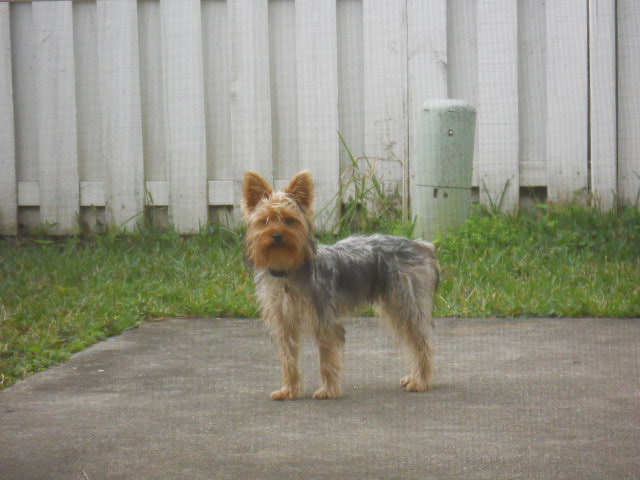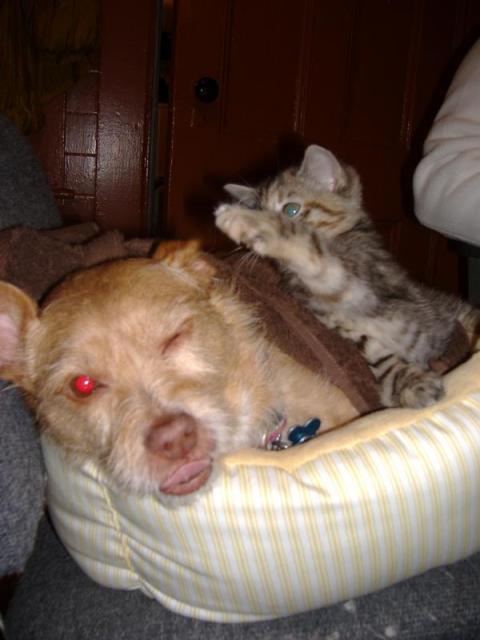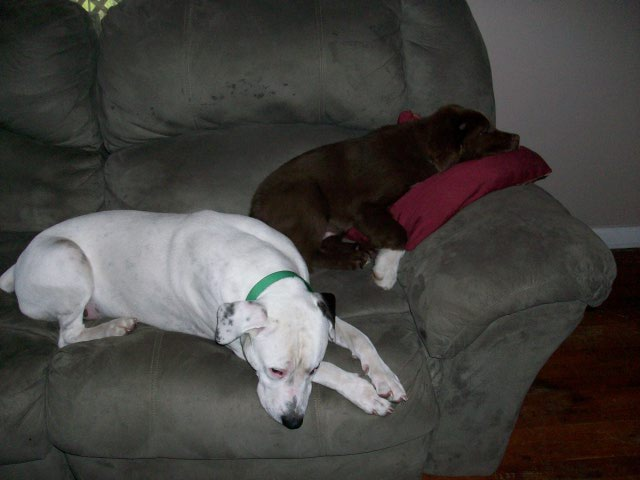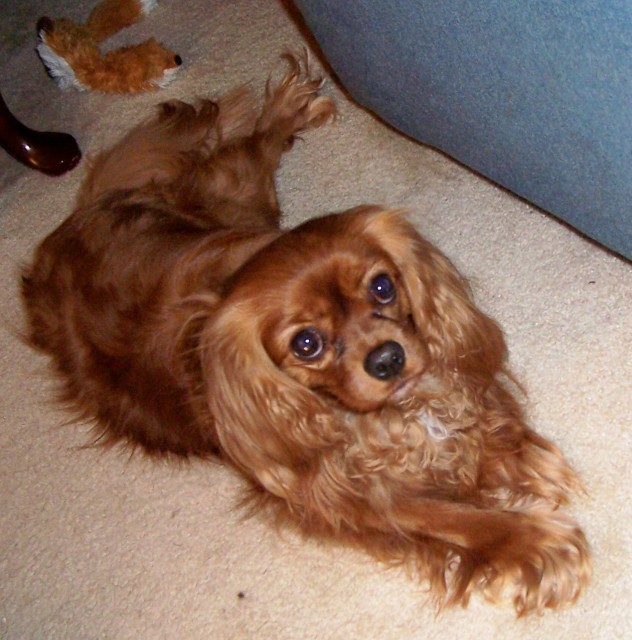QuestionQUESTION: Jackson is male neutered Miniature Schnauzer, probably about 2 years old and a rescue I acquired about 5 months ago. I acknowledge his need for a lot of exercise, but his behavior discourages my walking him. Right out the door he is all eyes, ears, and nose and literally quivers with excitement to sight squirrels, birds, and cats. His response to other animal smells is a flattening of his body to the ground with legs flat out and his nose buried in the ground. When sighting squirrels and cats he lets out a loud, high-pitched scream. He cannot be calmed or distracted with a sit command and me standing in front to block his view, or tempting him with a treat. I do an about-face to walk the opposite direction and I end up dragging him behind me while he is screaming and trying to go back toward the squirrel. He frantically runs side to side pulling at the lead screaming. He has the same reaction when sighting these animals through the window from inside the house. I am at my wit's end, having worked a couple months with a dog behaviorist to no avail. I have no history on him and think the loud high-pitched screaming is just his happy, crazy voice that I will never be able to change. Is there any other method(s) to try to squelch his excitability to prey before he reaches the point of no return with the screaming? Could he have a chemical imbalance or deficiency that I should have him tested for?
ANSWER: You're seeing the reason Jackson was in rescue.
This dog may have a genetic predisposition to cognitive dissonance and he may also have a focal seizure disorder (temporal lobe). It is quite difficult to diagnose these seizures, requiring expensive testing (which often results in little or no adequate evaluation.) The fact that he flattens himself on the ground (NOT that he is not distractable, that's fairly normal for a high prey response) tells me that something abnormal is occurring. He may have LEARNED this (from having been physically punished when he demonstrated this behavior in a former home) or he may be demonstrating a real cognitive breakdown (fight/flight/freeze). I suggest you go to a veterinary neurologist with this behavior; worst case scenario, the dog gets a prescription for a Clomicalm (anti-anxiety) regimen. You need to find a better "behaviorist". This is a behavior that needs to be more carefully evaluated and counter conditioned. Call the veterinary college in your geographical area and ask for referral; you might need this call to locate a veterinary neurologist. Meanwhile, do NOT drag the dog. If he obtained this "flat" response because of inappropriate "correction" by a human in the past, this is making it worse. Fit him for a Halti or Gentle Leader and change direction gently; reward with food the MOMENT his attention goes BACK to you (no matter how long it takes). You should see some improvement over time using this response, especially if he's on medication. But you definitely need a second opinion from a real behaviorist who is able to observe this in person.
---------- FOLLOW-UP ----------
QUESTION: Thank you for promptly responding. These rescues off of death row come with lots of silent baggage and it makes me so sad that people just give up on them. I will admit Jackson has been a surprising challenge to me. I have been determined to give him the second chance he deserves, but he has begun to bring me more grief and stress than joy lately. I am not ready to give up on him and feel relieved that his problem is not entirely an owner/leadership one. I will schedule him for a consult with my vet to discuss an anti-anxiety drug to assist me in further training. You know, when he often flattens to the ground in smelling pleasure, it looks to me like he is physically grounding himself or trying to firmly attach himself with all fours and body weight to the ground in anticipation of being pulled away from his state of euphoria. Perhaps that smelling stimulates him enough to put him over the top and primed for screeching and excitement over spotting potential prey. My other dog is a Schnoodle (Schnauzer/Poodle mix rescue), so I have convinced myself that Jackson must be a Schnound, as my bones feel hound dog deep in that little guy. I will work on redirecting that sniffing instinct with a treat to see if we can check the excitement before we get past our own driveway. Thanks again for your input!
AnswerThe more you describe the situation, the more I am convinced that someone, somewhere, used a strong aversive/punisher when the dog responded to stimuli with an over the top behavior. When the dog FLATTENS himself, that is an enormously aberrant response to high prey drive or excitability. It MUST be a response learned from serious correction (perhaps e collar). The Miniature Schnauzer is a very excitable breed, and even its first generation mix must inherit a close to full genetic load. The dog has learned to 'freeze', which has exacerbated his internal state. BE CAREFUL redirecting the instinct (because it isn't purely instinct, it has been tampered with.) No matter how long it takes the dog to respond to your change of direction (while you are ACTIVELY ignoring him -- so to speak), be VERY SURE not to reward his still hyper excited state. As the late great John Fisher used to say, "you know what you're trying to teach, but you have to know what the dog is learning." Additionally, his high excitability has been artificially elevated by whatever method was used to attempt to correct it. Adrenaline must be pumping at full volume while this dog is literally "down". THIS CAN BE FIXED. It will take patience, the assistance of medication, a very sound counter conditioning protocol for the course of several weeks (or more), and a strong redirected stimulus. Try play training with this dog in an area where his hyper excitability isn't likely to flare up. Attempt to create a trophy object (much like when training a S&R dog). You sound like you know what you're doing; in your hands, he can rehabilitate. Please post updates.

 Nightmares?
Question
Beethoven
Hi Melissa, Ive had my very h
Nightmares?
Question
Beethoven
Hi Melissa, Ive had my very h
 agressive silky terrier
Question
Lucas 1 year old
Hi Jennifer:
I have a
agressive silky terrier
Question
Lucas 1 year old
Hi Jennifer:
I have a
 My dog is shaking and hiding under my bed recently
QuestionRorrie and Pencil
QUESTION: My dog, Rorr
My dog is shaking and hiding under my bed recently
QuestionRorrie and Pencil
QUESTION: My dog, Rorr
 American Bulldog aggression
Question
Buddy and Rez
I have a 2 year old Ameri
American Bulldog aggression
Question
Buddy and Rez
I have a 2 year old Ameri
 Dog light and shadow chasing
Question
Jenni
My 3 year old Cavalier King Charles Span
Dog light and shadow chasing
Question
Jenni
My 3 year old Cavalier King Charles Span